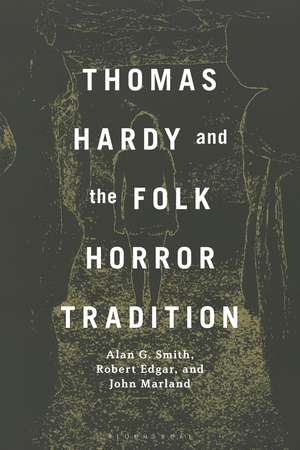Thomas Hardy and the Folk Horror Tradition
Autor Dr. Alan G. Smith, Professor or Dr. Robert Edgar, Dr. John Marlanden Limba Engleză Hardback – 31 mai 2023
Preț: 466.21 lei
Preț vechi: 645.56 lei
-28% Nou
Puncte Express: 699
Preț estimativ în valută:
89.22€ • 92.62$ • 74.39£
89.22€ • 92.62$ • 74.39£
Carte tipărită la comandă
Livrare economică 24 martie-07 aprilie
Preluare comenzi: 021 569.72.76
Specificații
ISBN-13: 9781501383991
ISBN-10: 150138399X
Pagini: 192
Dimensiuni: 152 x 229 x 20 mm
Greutate: 0.42 kg
Editura: Bloomsbury Publishing
Colecția Bloomsbury Academic
Locul publicării:New York, United States
ISBN-10: 150138399X
Pagini: 192
Dimensiuni: 152 x 229 x 20 mm
Greutate: 0.42 kg
Editura: Bloomsbury Publishing
Colecția Bloomsbury Academic
Locul publicării:New York, United States
Caracteristici
Traces the lineage of folk horror in its contemporary incarnation back to Thomas Hardy, as well as the socio-philosophical underpinning for the use of its specific genre tropes
Notă biografică
Alan G Smith is a researcher who specializes in screenwriting, TV drama and Thomas Hardy. He has contributed to Adaptation for Screenwriters (Bloomsbury, 2019), an anthology Horrifying Tales (2021) and the forthcoming Venue Stories (2023).Robert Edgar is Professor in the York Centre for Writing based in the School of Humanities at York St John University, UK. He has published on Screenwriting (2009), Directing Fiction (2009), The Language of Film (Bloomsbury, 2010 and 2015), The Music Documentary (2013), The Arena Concert (Bloomsbury, 2015) and Film Adaptation for Scriptwriters (Bloomsbury, 2019). John Marland is Senior Lecturer in Film and Literature at York St John University, UK, where he has both taught and developed undergraduate courses in scriptwriting. He has published on Screenwriting (2009), The Language of Film (Bloomsbury, 2010 and 2015), and Adaptation for Scriptwriters (Bloomsbury 2019).
Cuprins
AcknowledgementsIntroduction: 'Down their carved names the rain-drop ploughs'1. Foundations: Towards a Hardyan Folk Horror2. Haunted Hardy3. Cultural Bereavement4. Re-Enchantment5. Hardy Constructed and Re-Constructed6. Hardy's Range of Narrative Perspectives7. Wessex on Page and ScreenConclusion: 'Teach me to live that I dread the grave as little as my bed'Works CitedIndex
Recenzii
This uniquely individual book melds the traditions of folklore, folk horror, the Gothic and surrealism in order to create an enhanced experience, one focused on interiority, for when we reread the novels, short stories and poetry of Thomas Hardy that we know and love. We are presented with witches and conjurors, skimmity rides and phantom coaches alongside Social Darwinism and eugenics and the 'wierding' of Emma Gifford, Hardy's first wife. Such eclectic elements combine with the philosophy of Schopenhauer and Taylor's notion of the Immanent Frame to remind us of how Hardy re-enchants the universe - reconnecting us with 'an experience that modernity disavows.' From The Wickerman to Hookland, the authors seamlessly posit Hardy as progenitor of modern folk horror and its many visual adaptations, lamenting that with one exception, the 1970s television adaption of certain stories from Wessex Tales, the 'eerie' in Hardy's stories is often turned to the 'dreary', favouring the 'heritage' approach at the cost of the sublime and the supernatural. This book aims to redress that balance, and does so exceedingly well.
This book breaks new and important ground. Pointing to a long and deep British history of folk horror, Thomas Hardy and the Folk Horror Tradition delves into folklore, contemporary texts, and Victorian literature. Uncovering a little examined vein of Hardy's work, this book paves the way for new and exciting explorations of not only Hardy scholarship but also the whole tradition of folk horror. Identifying a 'Hardyan folk horror', the authors focus on his 'dark side', leading to an enticing and reinvigorating conception of Hardy, his landscapes, beliefs, and the eerie folklore of Wessex. By proving that Hardy's folk horror was indeed 'of its age', the authors open up a whole new world for folk horror scholars, Victorianists, and Hardy specialists.
This book breaks new and important ground. Pointing to a long and deep British history of folk horror, Thomas Hardy and the Folk Horror Tradition delves into folklore, contemporary texts, and Victorian literature. Uncovering a little examined vein of Hardy's work, this book paves the way for new and exciting explorations of not only Hardy scholarship but also the whole tradition of folk horror. Identifying a 'Hardyan folk horror', the authors focus on his 'dark side', leading to an enticing and reinvigorating conception of Hardy, his landscapes, beliefs, and the eerie folklore of Wessex. By proving that Hardy's folk horror was indeed 'of its age', the authors open up a whole new world for folk horror scholars, Victorianists, and Hardy specialists.
